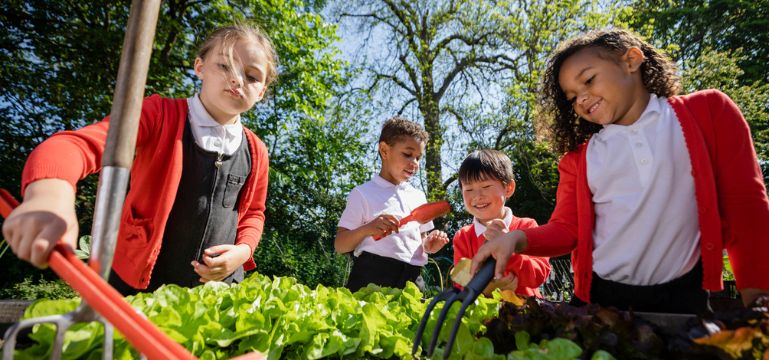The schools use of outdoor learning to meet the complex and sensory needs of pupils.

Quick links:
Information about the school
Riverbank School is situated in the West of Cardiff and is part of the Western Learning Federation working alongside Ty Gwyn and Woodlands School. It is maintained by Cardiff City Council local authority. The additional learning needs of pupils are varied. Just under half of pupils have speech, communication and language difficulties and a further quarter have autistic spectrum condition (ASC). Just under two fifths of pupils have severe learning difficulties. Fourteen per cent of pupils have a general learning difficulty and and/or physical and medical needs. Nearly all the pupils have a Statement of Special Educational Needs or Individual Development Plan which include physical, sensory, medical, emotional and behavioural difficulties.
English is the predominant language for many pupils. Currently no pupils speaking Welsh as a first language. Just under a fifth of pupils come from minority ethnic backgrounds and just over a quarter of pupils and their families speak English as an additional language. Just over a third of pupils receive free school meals.
Context and background to the effective or innovative practice
Riverbank benefits from an extensive outdoor area including spaces for play, a garden, an area dedicated to learning more about the natural environment and a hobbit hut. Pupils use the hobbit hut to develop skills across the curriculum. It also provides a welcoming environment for pupils to read.
In addition, children develop balance and co-ordination skills when using bikes and trikes.
Description of nature of strategy or activity
Each classroom has its own individual outdoor learning area which is accessed regularly, and pupils are encouraged and supported to learn using the outdoor spaces that are available to them.
Pupils thoroughly enjoying exploring the garden area. They plant vegetables and watch with keen interest as their vegetables grow. Other spaces that have been developed where pupils can explore, experiment, and play in a multi-sensory environment. For example, pupils under the careful eye of qualified staff, learn how to build fires and roast marshmallows.
Overall, pupils are encouraged to be creative in these areas using messy play in mud and water, the sand pit, and the ball pit to express themselves and take supported risks.
What impact has this work had on provision and learners’ standards?
The school understands the importance of providing natural sensory experiences for its pupils. Such experiences allow pupils to develop a better understanding of the world around them and provides them with learning opportunities that may not otherwise have. Over time pupils become more confident and independent.
The school has observed that their pupils are at their happiest when they are immersing themselves in the outdoor environment. This has a positive impact on pupils’ wellbeing and engagement in learning. The school has noticed that providing regular planned opportunities for pupils to access the outdoor learning environment has improved pupils’ ability to emotionally regulate. As a result, there has been a reduction in incidents of challenging behaviour.
How have you shared your good practice?
Staff at the school regularly reflect on the provision it makes and the impact this has on pupils. Staff willingly discuss effective practices with one another. In addition, the school uses an online tool to share the learning experiences of pupils with their parents or carers.